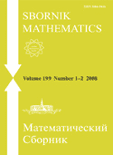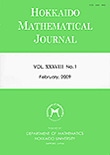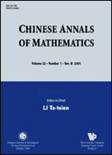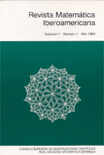
Journal of Mathematical Study
Scope & Guideline
Nurturing Excellence in Mathematical Research
Introduction
Aims and Scopes
- Theoretical Mathematics:
Focus on advanced theoretical frameworks, including algebra, geometry, and analysis, contributing to the foundational aspects of mathematics. - Applied Mathematics:
Publication of research that applies mathematical techniques to solve real-world problems across various fields such as physics, engineering, and economics. - Numerical Analysis and Computational Methods:
Investigation of numerical techniques and algorithms for solving mathematical problems, particularly in differential equations and optimization. - Functional Analysis and Operator Theory:
Exploration of properties and behaviors of operators and functionals, including studies on various spaces and their applications. - Differential Equations and Dynamical Systems:
Research on the existence, uniqueness, and behavior of solutions to various types of differential equations, including both ordinary and partial equations. - Geometric Analysis and Topology:
Focus on the interplay between geometry and analysis, with studies on manifolds, curvature, and other topological properties. - Algebraic Structures and Theory:
Examination of various algebraic systems, including rings, groups, and modules, and their applications in pure and applied mathematics. - Mathematical Modeling:
Development and analysis of mathematical models to represent and solve problems in science and engineering.
Trending and Emerging
- Nonlinear Dynamics and Chaos Theory:
There is an increasing interest in nonlinear dynamics and chaos theory, particularly in the context of differential equations, indicating its relevance in modeling complex systems. - Algebraic Topology and Its Applications:
Research in algebraic topology is gaining traction, especially its applications in data analysis and machine learning, reflecting a growing interdisciplinary approach. - Mathematical Physics:
The intersection of mathematics and physics is trending, with a focus on mathematical methods in quantum mechanics and general relativity, highlighting the importance of mathematics in theoretical physics. - Advanced Numerical Methods:
There is a notable increase in publications on advanced numerical methods, particularly in relation to fractional calculus and differential equations, showcasing the demand for computational solutions. - Variational Methods and Optimization:
The rise of variational methods in optimization and their applications in various fields, including engineering and economics, indicates a growing interest in these mathematical techniques.
Declining or Waning
- Classical Real Analysis:
Research in classical real analysis, including foundational theorems and methods, has seen a decrease, likely as more attention is directed towards applied and computational aspects of analysis. - Elementary Number Theory:
Papers focusing on basic number theory concepts have become less frequent, possibly due to the increasing complexity and abstraction in current mathematical research. - Traditional Algebraic Geometry:
The interest in classical algebraic geometry appears to be waning, with fewer publications as researchers shift towards modern approaches and computational techniques. - Statistical Mathematics:
Submissions related to classical statistical methods are declining, as the field increasingly emphasizes data science and computational statistics. - Homological Algebra:
Research in homological algebra has reduced, potentially reflecting a broader trend towards more applied mathematical frameworks and computational approaches.
Similar Journals

SBORNIK MATHEMATICS
Connecting Mathematicians Through Groundbreaking ResearchSBORNIK MATHEMATICS is a distinguished journal dedicated to advancing research in the field of mathematics, particularly focusing on areas such as algebra and number theory. Published by the esteemed Steklov Mathematical Institute of the Russian Academy of Sciences, this journal has been a prominent platform for scholarly communication since its inception in 1993 and continues to thrive with contributions of significant relevance through 2024. The journal maintains a Q2 ranking in both the algebra and number theory category as well as in miscellaneous mathematics, highlighting its competitive standing in the mathematical community. While it is not an open-access publication, it offers critical insights and innovative research that are vital for mathematicians, researchers, and students alike. With an ISSN of 1064-5616 and an E-ISSN of 1468-4802, SBORNIK MATHEMATICS serves as a crucial resource for anyone looking to deepen their understanding of contemporary mathematical developments.

CUBO-A Mathematical Journal
Advancing Knowledge Across Mathematical DisciplinesCUBO-A Mathematical Journal, published by the Department of Mathematics and Statistics at Universidad de La Frontera in Chile, stands as a significant Open Access resource in the field of mathematics since its inception in 2011. With an ISSN of 0716-7776 and an E-ISSN of 0719-0646, this journal invites submissions that explore a wide spectrum of mathematical disciplines, including Algebra, Number Theory, Analysis, Geometry, Topology, and Logic. Although currently positioned in the Q4 category across various mathematical domains and registered at Rank #223/399 in General Mathematics in Scopus, CUBO serves as a valuable platform for emerging researchers and practitioners to disseminate their findings. Operating under a continuous commitment to accessibility, CUBO fosters an inclusive academic environment that supports the exchange of innovative ideas vital to advancing mathematics. The journal's target audience encompasses a diverse community of researchers, professionals, and students eager to participate in the expanding dialogue within mathematical sciences.

Moscow University Mathematics Bulletin
Celebrating Creativity and Rigor in Mathematical SciencesMoscow University Mathematics Bulletin is a distinguished academic journal published by Springer International Publishing AG, focusing on the dynamic field of mathematics. With an ISSN of 0027-1322 and an E-ISSN of 1934-8444, this journal serves as a platform for innovative research and developments in various mathematics sub-disciplines, making significant contributions to both theoretical and applied mathematics. While it holds a Q3 ranking in the field of Mathematics (miscellaneous) for 2023, this journal remains dedicated to fostering academic discourse among mathematicians. Researchers, professionals, and students will find value in the diverse range of articles that embody rigor and creativity. Although currently not an Open Access publication, the journal provides numerous access options through institutional or personal subscriptions. From its inception in 2007 to its expected continuity until 2024, the Moscow University Mathematics Bulletin is committed to enhancing the understanding and appreciation of mathematical sciences.

Hokkaido Mathematical Journal
Innovating ideas in mathematics from Hokkaido and beyond.Hokkaido Mathematical Journal, published by Hokkaido University, Department of Mathematics, stands as a pivotal platform for scholarly discourse in the field of mathematics. Established in 1972, this peer-reviewed journal has consistently contributed to the advancement of mathematical research, covering a wide spectrum of topics within the discipline. With its current ranking in the third quartile (Q3) among miscellaneous mathematics journals, it offers valuable insights and findings that cater to both established researchers and budding mathematicians alike. The journal is accessible through traditional subscription, fostering a community that values rigorous theoretical exploration and applied mathematical methods. As it approaches its convergence year in 2024, Hokkaido Mathematical Journal remains essential for those dedicated to pushing the boundaries of mathematical knowledge and innovation in Japan and beyond.

ANNALI DI MATEMATICA PURA ED APPLICATA
Elevating Mathematical Discourse Since 1858ANNALI DI MATEMATICA PURA ED APPLICATA is a prestigious journal published by Springer Heidelberg, focusing on the field of Applied Mathematics. With a rich history dating back to its initial publication stages from 1858, this journal continues to serve as a vital platform for researchers and professionals seeking to disseminate high-quality, peer-reviewed research. The journal's strong reputation is reflected in its Q1 ranking in Applied Mathematics and its Scopus rank of #335 out of 635, placing it in the 47th percentile, showcasing its impact in the field. Although it is not an open-access journal, it provides exclusive insights and advancements in mathematical applications, allowing academics to explore innovative methodologies and theoretical developments. The combination of its long-standing tradition and contemporary relevance makes ANNALI DI MATEMATICA PURA ED APPLICATA an essential resource for scholars and students looking to deepen their understanding of mathematics and its practical applications.

Mediterranean Journal of Mathematics
Advancing Mathematical Frontiers in the Mediterranean BasinThe Mediterranean Journal of Mathematics, published by SPRINGER BASEL AG, is a prominent platform dedicated to the advancement of mathematical research and education. Since its inception in 2004, this journal has been pivotal in disseminating high-quality research across various fields of mathematics, currently holding a notable Q2 ranking in the miscellaneous mathematics category as of 2023. With its ISSN 1660-5446 and E-ISSN 1660-5454, the journal enjoys a respected position in the academic community, evident by its Scopus rank of 129 out of 399 in General Mathematics, placing it in the 67th percentile. While primarily a subscription-based journal, it remains committed to providing a comprehensive resource for researchers, professionals, and students, fostering dialogue and exploration within the mathematical sciences. The Mediterranean Journal of Mathematics, based in Basel, Switzerland, continues to contribute significantly to the evolution of mathematical theory and practice, marking its relevance as we approach its 20th anniversary in 2024.

CHINESE ANNALS OF MATHEMATICS SERIES B
Fostering Excellence in Applied Mathematics ResearchCHINESE ANNALS OF MATHEMATICS SERIES B, published by Shanghai Scientific Technology Literature Publishing House, is a prominent journal dedicated to fostering research and development in the field of mathematics. With an ISSN of 0252-9599 and an E-ISSN of 1860-6261, this journal provides a platform for the dissemination of innovative mathematical theories and methodologies. As of 2023, it is categorized within the Q4 quartile in *Applied Mathematics* and has achieved a commendable Q3 rank in *Mathematics (miscellaneous)*, emphasizing its growing influence in academia. Despite not being an open-access publication, it serves as a valuable resource for researchers, professionals, and students seeking to explore diverse mathematical topics, particularly from a unique regional perspective. The journal's extensive publication history—from 1980 and continuing to 2024—demonstrates a longstanding commitment to advancing mathematical knowledge and providing insights into various disciplines related to mathematics.

Italian Journal of Pure and Applied Mathematics
Fostering Innovative Research in Pure and Applied MathematicsThe Italian Journal of Pure and Applied Mathematics, published by FORUM EDITRICE UNIV UDINESE, is an esteemed platform dedicated to the dissemination of high-quality research within the field of mathematics. With an ISSN of 1126-8042 and an E-ISSN of 2239-0227, this journal serves as a crucial resource for mathematicians seeking to contribute to current discussions and advancements in both pure and applied mathematical sciences. Although the journal currently holds a quartile rank of Q4 in the field of miscellaneous mathematics and is positioned within the 10th percentile of Scopus rankings, it remains committed to fostering valuable academic discourse. This journal particularly welcomes submissions that explore innovative mathematical theories and methodologies, offering a unique insight into the diverse aspects of mathematical research. Operating under a traditional access model, it provides a gateway for researchers, professionals, and students to deepen their understanding and expand their contributions to the mathematical community. With coverage spanning from 2010 to 2024, the journal continues to enhance its reputation as a reliable source of contemporary mathematical scholarship.

Results in Mathematics
Cultivating a Community of Mathematical Excellence.Results in Mathematics, published by SPRINGER BASEL AG, is a prestigious academic journal dedicated to advancing the field of mathematics since its inception in 1978. Based in Switzerland, this journal has garnered a significant reputation, holding a Q2 ranking in both Applied Mathematics and miscellaneous Mathematics categories according to the latest 2023 metrics. The journal is a vital resource for researchers, professionals, and students, encouraging open dialogue about emerging mathematical concepts and methodologies. Our editorial objective is to publish high-quality research articles that contribute to theoretical advancements and practical applications in mathematics. Although it does not currently offer open access options, it provides in-depth studies and articles that fortify the knowledge base within the mathematical community. With a commitment to innovation and academic rigor, Results in Mathematics continues to serve as an essential platform for scholarly communication and exploration.

REVISTA MATEMATICA IBEROAMERICANA
Exploring the frontiers of mathematics since 1996.REVISTA MATEMATICA IBEROAMERICANA, published by the EUROPEAN MATHEMATICAL SOCIETY, is a leading open-access journal dedicated to advancing the field of mathematics. Since its inception in 1996, the journal has provided a platform for high-quality research up to 2024, achieving a prestigious Q1 ranking in the miscellaneous mathematics category and placing it within the top 77th percentile of the Scopus rankings. Based in Spain, this journal fosters a vibrant academic community by disseminating innovative research, theoretical insights, and applications within the broad scope of mathematics. With its commitment to open access established in 2022, REVISTA MATEMATICA IBEROAMERICANA ensures that groundbreaking research is accessible to scholars, practitioners, and students worldwide, emphasizing the importance of collaboration and knowledge sharing in the mathematical sciences. The journal is a vital resource for anyone invested in the evolution of mathematics, providing a rich array of articles that contribute to both the theoretical and applied landscapes of the discipline.